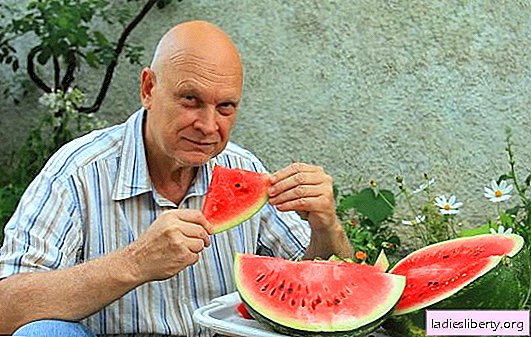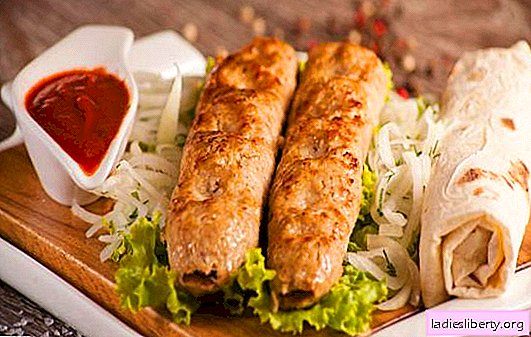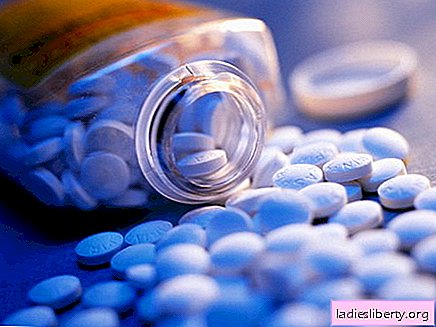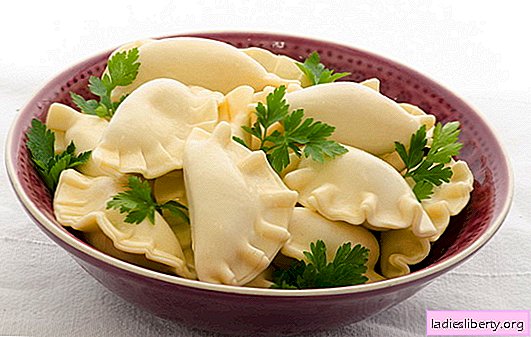
Watermelon is a giant berry that everyone loves, but its season is too short. With the existing pathology of the digestive tract, not everyone knows if watermelon is possible with pancreatitis or other diseases of the digestive tract.
Dietary nutrition is one of the important components in the treatment of pancreatitis. Patients suffering from this pathology need to understand exactly whether it is possible to have watermelon with pancreatitis, in what quantities, at what time of the day it is recommended to eat it so as not to exacerbate the disease.
Watermelon composition
Watermelon contains many vitamins (A, E, C, group B - B1, B2, B6, PP), micro and macro elements. It also includes proteins, fats and carbohydrates, lycopene, dietary fiber. This makes it a useful dietary product for various diseases. Watermelon is one of the lowest-calorie ones (in 100 g of pulp - 38 kcal): about 96% is water.
In any course of pancreatitis, including the phase of remission in a chronic disease, there is a restriction on the use of fats, carbohydrates, dietary fiber. Their low content (0.4 g of dietary fiber, fat - 0.2 g, carbohydrates - 8.8 g per 100 g of pulp, of which 2.4 g of glucose and 4.4 fructose, which does not require the production of insulin) is the positive factor that must be considered when compiling a diet.
Metabolism of the components of watermelon in pancreatitis
Dietary fiber is not digested by enzymes in the stomach and duodenum, and is only processed in the large intestine. This contributes to the emergence of the fermentation process, increased gas formation, which leads to flatulence, abdominal pain, the appearance of loose stools.
Carbohydrates have an adverse effect on the composition of pancreatic juice and increase insulin secretion depending on the amount of sweet food eaten. The content of simple and complex carbohydrates (di- and polysaccharides) in the watermelon juice stimulates the bile formation process and can provoke the development of acute pancreatitis or exacerbate the process chronically. The use of fat in pancreatitis is contraindicated. Therefore, to decide whether it is possible to watermelon with pancreatitis, it is necessary in each case individually, depending on the patient's condition and stage of the disease.
With pancreatitis or any other pathology of the digestive tract, nutrition should be gentle, not irritating the mucous membranes of the stomach and intestines, since all organs and processes that occur in them are interconnected. This applies not only to the composition of the food, but also to the amount consumed.
Useful properties of watermelon
Watermelon has many useful properties for the human body:
• it is a mild diuretic, choleretic and laxative;
• contains fat - and water-soluble vitamins (A, E, C and several B vitamins) and lycopene, which have a powerful antioxidant effect, are involved in the anti-inflammatory process mechanism, preventing the formation of neoplasms, aging of the body;
• due to the predominant content of fructose, it does not cause the formation of a large amount of insulin and therefore does not create a large load on the pancreas;
• folic acid (vitamin PP), contained in large quantities, accelerates the process of protein absorption;
• a high content of magnesium, in addition to affecting the heart muscle, is the prevention of the formation of kidney stones and gall bladder, which is often a concomitant process in pancreatitis.
Watermelon rules
In addition, there are some dangers in its use, even in the period of persistent remission of pancreatitis. Concerning:
• the use of unripe berries is contraindicated;
• to exclude the use of watermelon with yellowish veins in food - this is a sign of nitrates contained in it;
• it is not recommended to buy an incised fruit or part of it - it is possible that such berries are sour, and this can cause poisoning or exacerbation of pancreatitis;
• you can’t eat watermelon immediately after eating, especially after salty foods (if you take a portion of watermelon after eating, the process of digestion due to fermentation will drastically slow down, after salty, the excretion of fluid from the body will be disrupted, which will lead to edema)
• it is recommended to eat it between meals or instead of them;
• it is undesirable to use it too cold - the temperature of the berry should be room temperature;
• it is unacceptable to exceed a certain amount of watermelon;
• it is forbidden to include a pickled product in the diet, including because of the presence of vinegar and preservatives harmful to pancreatitis, but it is possible in reasonable quantities in the form of juice, desserts, preserves, candied fruits, as part of fruit salads.
It must be remembered that with pancreatitis, drinking watermelon is permissible only if the remission is long, and there are no complaints and the slightest disturbance in the functions of the digestive system.
Is it possible to watermelon with acute pancreatitis
Thus, whether watermelon is possible with pancreatitis depends on whether the disease is diagnosed in acute or chronic.
In acute pancreatitis, all fresh berries, fruits and vegetables are contraindicated. You can use them only after heat treatment.
Based on this, watermelon does not fall into the category of permitted products, especially salted or pickled.
Even a small amount will lead to a sharp deterioration of the condition: bloating, pain, nausea, diarrhea, and possibly vomiting will appear. Therefore, watermelon in acute pancreatitis is strictly contraindicated.
Recommendations for chronic pancreatitis
In the chronic course of pancreatitis, in the phase of complete remission, after prolonged use of table No. 5P, diet No. 5 is recommended.
Only in the stage of a complete absence of manifestations of the disease can watermelon be used after consultation with a doctor. In order not to aggravate the process, it is necessary to strictly adhere to the recommendations given by the specialist. This applies to the amount of food eaten: it is necessary to introduce it into the diet gradually, starting initially with the intake of 100 ml of watermelon juice in a warm form.
If your well-being does not worsen, there will be no reaction, after 2 days you can use a small piece, in the future, the portion is increased. With a normal reaction of the body and the absence of exacerbation, you can eat up to 1.5 kg per day, dividing the intake into 5-6 servings.
The amount of watermelon in chronic pancreatitis for each person varies and depends on the characteristics of the body: 1.5 kg can be considered an insufficient "dose", but in some cases, exacerbation can be caused by eating 150 g.
Prevention of exacerbation of pancreatitis with watermelon
A kind of prevention of exacerbation of chronic pancreatitis is the right choice of watermelon.
A ripe and healthy watermelon should be:
• whole, without dents, scratches, cracks;
• intensely colored;
• fresh: when exposed to a nail on a juicy crust, scratches remain;
• medium size (watermelon weighing 5-7 kg is considered optimal): small - usually immature, but too large - contains nitrates;
• without any streaks, with uniform smooth flesh (any streaks indicate nitrates);
• purchased from mid-August to the end of September: the natural time for its ripening.
In any case, with the existing pathology of the pancreas, it is necessary to consult a doctor. You should always remember that any, even a very useful product, if abused, can cause exacerbation of chronic diseases.











